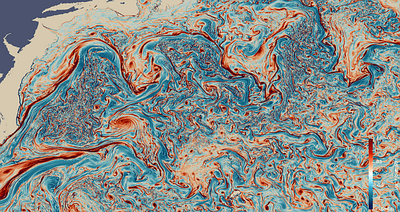
Duration
October 2022 to September 2025
Contact

Dr. Lars Hoffmann
Head of division HPC in Applied Science and Engineering
Building 14.14 / Room 4010
+49 2461/61-1978
E-MailExaOcean
Performance improvements of the ICON-O ocean model on heterogeneous exascale supercomputers using machine learning methods
High-performance computing (HPC) is now one of the fundamental research methods in many scientific disciplines. High-performance computers have been reaching the exaflop performance class (at least 1018 operations per second) since this year. For applications to efficiently exploit the power of exascale systems, scalability must be improved on very large and heterogeneous systems. A variety of components are required for modern high-performance computing: from processors to data storage and file systems to software and algorithms. All these components also require new technologies and adaptations to specific applications and interfaces.
The goal of the project ExaOcean is to accelerate the computation of the ICON-O ocean model by at least a factor of four using a combination of classical discrete algorithms and machine learning (ML) methods. Beyond the runtime reduction, this approach will thus also enable significantly better scalability on heterogeneous systems without losing accuracy and quality of the simulation. These innovative spectral deferred correction (SDC) methods also have the property that they use accelerators and modular supercomputers more efficiently than simple numerical methods alone could do.
The innovative core of the project is the combination of ML techniques with classical simulation and the use of new methods for time integration. This enables higher parallelism in the computation of simulations and thus a significant reduction in computing time. Modern supercomputers can thus be used much more efficiently and with less resource consumption.
The German Federal Ministry of Education and Research (BMBF) funds the joint research project ExaOcean on the basis of the funding guideline SCALEXA in the field of software and technology development in high-performance computing in the ExaFlop range under the grant number 16ME0682. ExaOcean is lead by Technische Universität Hamburg, with Deutsches Klimarechenzentrum, Max Planck Institut für Meteorologie, and the Jülich Supercomputing Centre being project partners.

